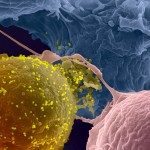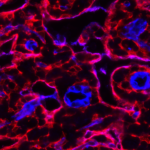Lien vers Pubmed [PMID] – 22508836
J. Exp. Med. 2012 May;209(5):1029-47
Autophagy is an important survival pathway and can participate in the host response to infection. Studying Chikungunya virus (CHIKV), the causative agent of a major epidemic in India, Southeast Asia, and southern Europe, we reveal a novel mechanism by which autophagy limits cell death and mortality after infection. We use biochemical studies and single cell multispectral assays to demonstrate that direct infection triggers both apoptosis and autophagy. CHIKV-induced autophagy is mediated by the independent induction of endoplasmic reticulum and oxidative stress pathways. These cellular responses delay apoptotic cell death by inducing the IRE1α-XBP-1 pathway in conjunction with ROS-mediated mTOR inhibition. Silencing of autophagy genes resulted in enhanced intrinsic and extrinsic apoptosis, favoring viral propagation in cultured cells. Providing in vivo evidence for the relevance of our findings, Atg16L(HM) mice, which display reduced levels of autophagy, exhibited increased lethality and showed a higher sensitivity to CHIKV-induced apoptosis. Based on kinetic studies and the observation that features of apoptosis and autophagy were mutually exclusive, we conclude that autophagy inhibits caspase-dependent cell death but is ultimately overwhelmed by viral replication. Our study suggests that inducers of autophagy may limit the pathogenesis of acute Chikungunya disease.








